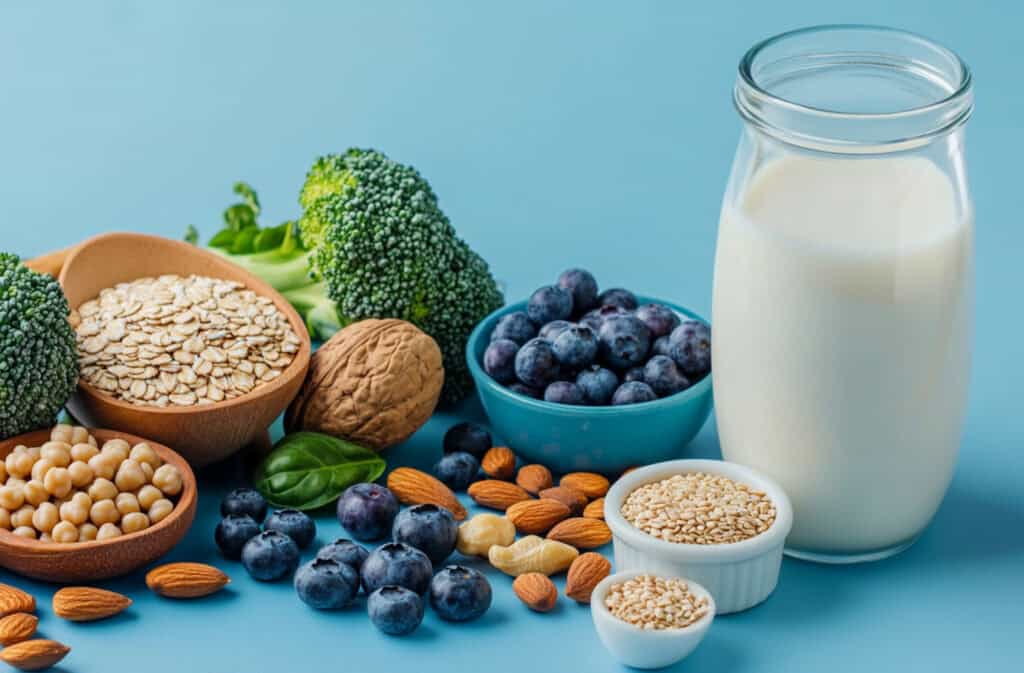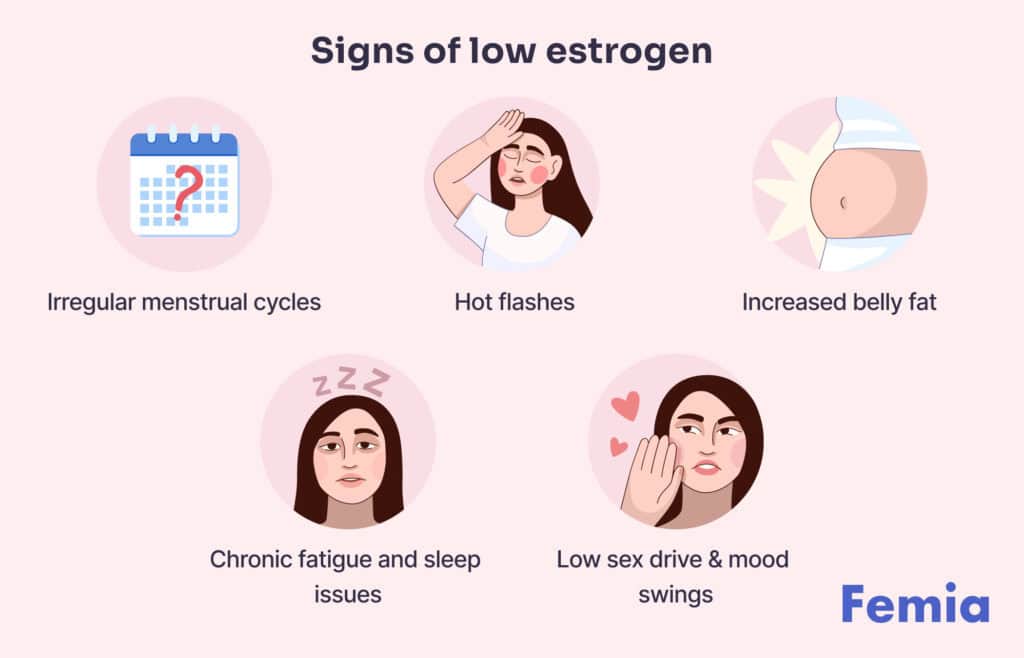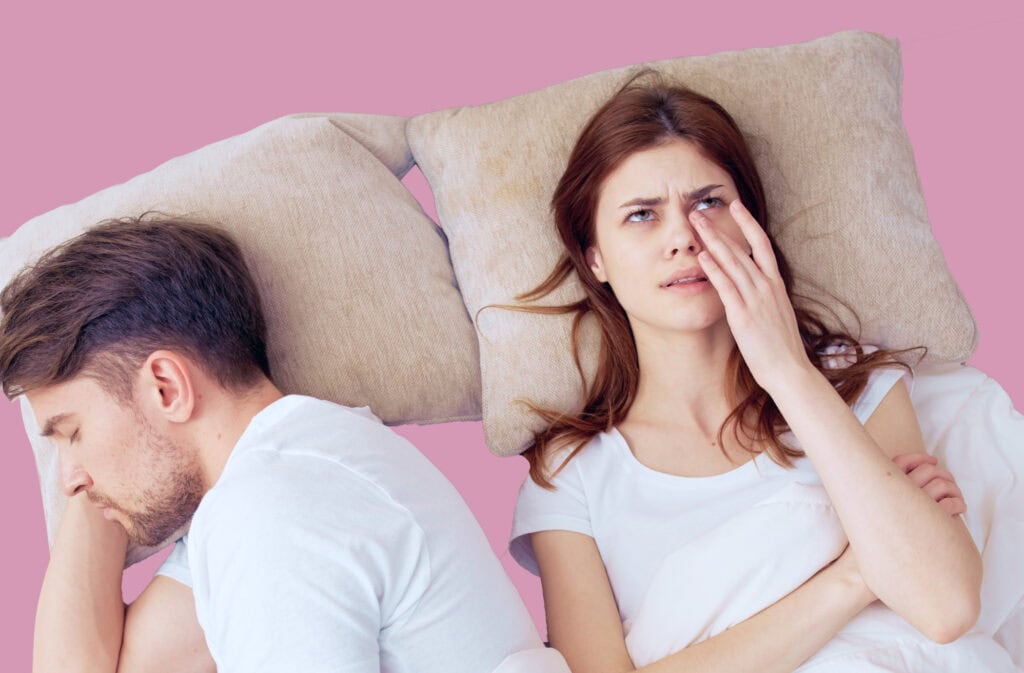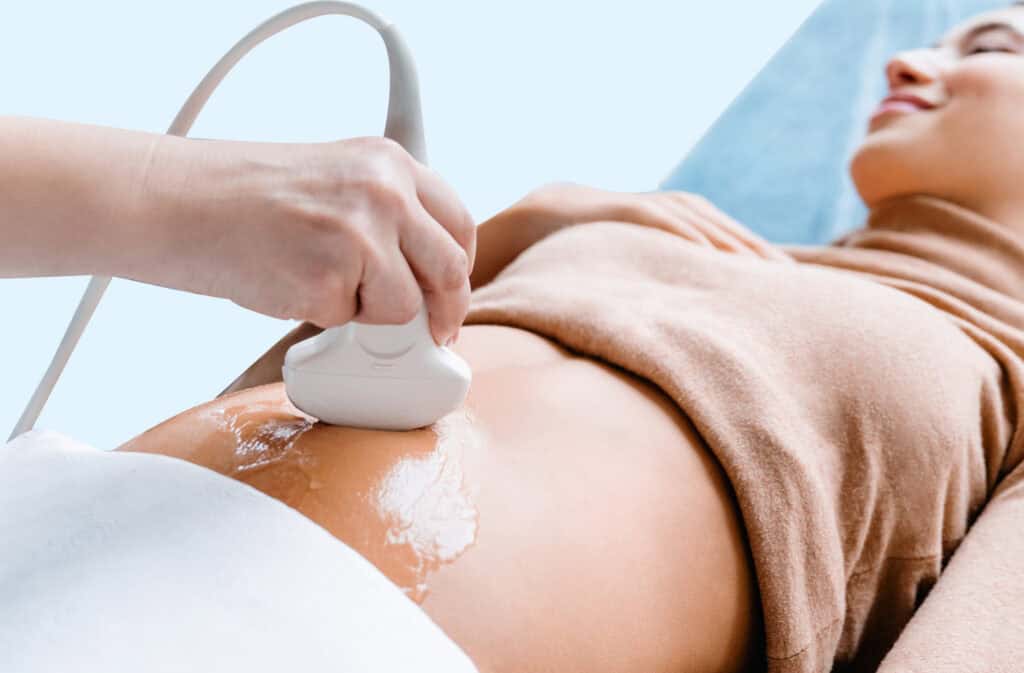Femia > Health Library > Your cycle > Health > How to increase estrogen naturally: Boost your hormones the natural way
How to increase estrogen naturally: Boost your hormones the natural way

- Updated Feb 11, 2025
- Published
CRAFTED BY HUMAN
Crafted by human At Femia, we provide accurate and up-to-date information at every stage of your journey, from trying to conceive, pregnancy and postnatal support. All content is created by a real person based on in-depth research and own professional experience. Femia ensures that you will receive expert advice, strict accuracy and a personalized approach from our authors/medical experts. Learn more about our editorial policy.
FACT CHECKED
Fact checked At Femia Health, we maintain the highest standards of editorial excellence in delivering content focused on helping you conceive, guiding you through pregnancy, and supporting you postpartum. Explore our content review principles to learn how we ensure the accuracy and quality of our health and lifestyle tips for every stage of your journey.
- Natural ways to boost estrogen include eating foods rich in phytoestrogens (soy, flaxseeds, fruits, vegetables), taking vitamins B, D, and E, exercising regularly.
- Herbal remedies like black cohosh and red clover may help, but research is limited.
- Consult your healthcare provider before considering any form of estrogen supplementation, as too much can pose health risks.
Estrogen is a key hormone in our bodies, playing important roles beyond just reproductive health. It helps regulate things like blood sugar, cholesterol, muscle and bone mass, and even brain function.
As we age or face certain health conditions, our estrogen levels can change. While it’s normal for these levels to fluctuate, maintaining a healthy balance is important for overall well-being.
And, while you can always get medications to help that, you may want to start with the natural ways to increase estrogen.
Note: Estrogen levels should be determined by lab tests, not symptoms alone. Remember, there’s limited research on natural oral supplements for estrogen. Consult your healthcare provider before considering any form of estrogen supplementation, as too much can pose health risks.
Femia helps millions of women understand and balance their hormones
Signs of low estrogen
Estrogen levels can rise and fall throughout your life, and this often happens in sync with other hormones controlling bodily functions. This changing cycle of estrogen levels is considered normal.
Having consistently low estrogen is a different story. Sometimes, it may mean that you are going through a natural process like menopause. In other cases, it could mean you have a health condition slowing your sexual development, making it harder to get pregnant when you want to.
Knowing the symptoms can help you stay proactive in making medical decisions to ensure your body produces enough hormones to keep you going.

1. Chronic fatigue and sleep issues
During menopause, women often experience changes in their sleep patterns and quality. Research has shown that menopausal women tend to have lower levels of melatonin, a hormone that plays a crucial role in regulating sleep.
If you’re experiencing chronic fatigue or poor sleep quality during menopause, it could be related to these hormonal changes. However, the relationship between hormones like estrogen and melatonin is complex and not fully understood.
2. Irregular menstrual cycles
Sometimes, irregular cycles might be linked to lower estrogen levels, but there could be other reasons too. Think of your menstrual cycle as a delicate dance of hormones, and when one partner (like estrogen) isn’t quite in step, it can throw off the whole routine.
There are a few different health conditions that might cause your cycle to be a bit unpredictable. For example:
- PCOS (Polycystic ovary syndrome). This common condition can cause your ovaries to march to their own beat, leading to irregular periods.
- Perimenopause. As you approach menopause, your body starts to change its hormone production. This transition period can sometimes make your cycles a bit less predictable.
3. Low sex drive & mood swings
Estrogen triggers serotonin production, and serotonin (our happy hormone) ensures you have a good mood. Therefore, low estrogen levels can be linked to mood swings, depression, and low sex drive, but it’s not a straightforward cause-and-effect relationship.
4. Hot flashes
An estrogen imbalance can significantly affect your body’s ability to regulate its temperature. This often results in hot flashes, which are common when women are going through menopause. Sometimes, low estrogen can also result in night sweats.
While these symptoms are often related to hormonal changes, it’s always a good idea to mention any new or persistent symptoms to your healthcare provider. They can help determine the cause and recommend appropriate ways to manage your comfort.
5. Increased belly fat
Since estrogen participates in regulating the metabolism, low estrogen levels caused by either imbalance or aging may cause increased fat deposits in your belly.
This hormone-related belly fat is often difficult to lose with regular training and diet changes, so it’s best to seek medical help if it’s something that worries you.
👉Find out more: Enhancing fertility naturally: A guide to fertility supplements and foods for women
How to increase estrogen naturally
Now, let’s explore how to boost estrogen with several practice-proven methods:
Dietary changes
Some dietary changes have been shown to increase estrogen naturally and reduce the risk of diseases associated with hormone imbalance.
Yes, the Mediterranean diet has been linked to supporting healthy estrogen levels. This diet is associated with high consumption of fish, vegetables, fruits, and legumes while restricting or at least limiting foods that have been shown to reduce estrogen levels, including red meat and high-fat processed foods.
In addition, the Mediterranean diet is rich in phytoestrogens—molecules with estrogen-like activity that you can get from foods like soy, legumes, nuts, grains, fruits, vegetables, and seeds. Vegetarian and plant-centric diets can also be a goodway to increase estrogen levels while supporting overall wellness.
Consider consuming foods like lentils, chickpeas, flax seeds, whole grains, soy products, and garlic, as these foods have been shown to be most effective in promoting healthier estrogen levels.
Vitamins and supplements
You can also increase estrogen levels by including several vitamins in your wellness routine. That is because vitamins provide the raw materials essential for your body to produce hormones. Some vitamins can also be used to help women get through menopause with fewer symptoms associated with low estrogen.
Here is the list of vitamins to consider adding to your diet or through supplements:
- B complex vitamins. Consuming B2, B6, B12, and folate makes it less likely for post-menopausal women to experience cognitive decline caused by lowered estrogen levels. A diet high in B6 may also be associated with delaying the onset of menopause. Vitamin B can be found in foods like dairy, leafy greens, whole grains, nuts, and seeds.
- Vitamin D. Vitamin D is linked to several hormone imbalances. A deficiency in vitamin D is associated with lower estrogen levels, causing symptoms like mood swings, hot flashes, and much more. These findings are primarily from animal studies though, and we can’t assume the same results would occur in humans without further research.
- Phytoestrogens. These are plant elements that have estrogen-like effects, so they also help combat symptoms and conditions that can be caused by estrogen deficiency.
- Probiotics. These are crucial for a healthy gut microbiome, which has been linked to hormone regulation. Adding probiotic supplements helps enhance the metabolism’s estrogen precursors, so you can balance its levels for overall health and reduced menopausal symptoms.
Herbal remedies
- Black cohosh. It’s a traditional Native American herb historically used to treat a variety of conditions, including menopause and menstrual issues. Even though more studies are needed to support its use in alleviating menopause symptoms, research suggests that black cohosh contains certain elements stimulating estrogen receptors.
- Red clover. It is a rich source of phytoestrogens, so it may also be helpful in increasing estrogen levels and reducing symptoms of menopause.
Exercise and lifestyle
Moderate physical activity is responsible for increased hormone production. Regular exercise has been shown to positively impact hormone levels, including estrogen. That is because exercising is especially powerful in activating the endocrine system, which leads to the production of multiple hormones. You can consider the following activity:
- Walking (30 minutes a day);
- Yoga;
- Stretching.
In addition, high cortisol levels or prolonged stress can lower estrogen levels. This often causes symptoms of hormonal imbalance. Managing stress levels through breathing exercises, meditation, or seeking professional help can also help keep cortisol levels in check.
👉Find out more: Cycle syncing workouts: Exercise according to your menstrual cycle
Foods that raise estrogen levels
Even though diet alone won’t significantly affect your hormones, adding some foods that help balance estrogen levels as a part of your wellness routine is always a good idea. Consider consuming more:
1. Dairy
Full-fat milk can contain estrogen, but it will depend on where the animal was in the lactation cycle when milk was taken.
2. Nuts and seeds
Nuts and seeds are high in phytoestrogen. While all contain some amount of this substance, some nuts have higher levels. These include:
- Brazil nuts;
- Almonds;
- Cashews;
- Roasted salted peanuts;
- Pine nuts;
- Walnuts,
- Sesame seeds.
3. Legumes
Legumes are one of the most studied sources of phytoestrogens. They also contain many vitamins and microelements crucial for overall health. Here is what you can add to your diet:
- Peas;
- Chickpeas;
- Lentils;
- Soybeans;
- Kidney beans;
- Mung beans;
- Pinto beans;
- Black-eyed peas;
- Lentils.
4. Fruits and vegetables
Berries and cruciferous vegetables are believed to have the highest amounts of phytoestrogen. Consider the following:
- Sprouts;
- Cabbage;
- Onion;
- Zucchini;
- Broccoli;
- Celeriac;
- Spinach;
- Garlic;
- Cauliflower;
- Cranberry;
- Blueberry;
- Strawberry;
- Cherry.
5. Grains
Some of the grains that are often used in cereals have higher rates of phytoestrogens. Some examples are:
- Whole wheat;
- Oats;
- Rye;
- Barley.
Vitamins to increase estrogen levels
We have already briefly mentioned that vitamins may help increase estrogen levels and reduce symptoms of menopause, but let’s dive a little bit deeper.
1. Vitamin E
Vitamin E is a powerful antioxidant that has beneficial effects on hormone balance, including estrogen production. As a vital player in endocrine system functioning, vitamin E may help alleviate menopausal symptoms like hot flashes. Some examples of foods containing vitamin E are:
- Almonds;
- Sunflower seeds;
- Spinach;
- Avocado;
- Wheat germ.
2. Vitamin B6 (Pyridoxine)
Vitamin B6 helps regulate hormone levels by supporting the liver’s detoxification process and regulating neurotransmitters involved in hormonal balance. Since too-high estrogen levels are also bad for fertility, vitamin B6 helps maintain a proper balance between estrogen and progesterone, supporting normal balance and reproductive health.
Foods rich in Vitamin B6 include:
- Chickpeas;
- Bananas;
- Salmon;
- Tuna;
- Turkey;
- Potatoes.
3. Magnesium
Magnesium supports more than 300 enzymatic processes in the body, including those related to hormonal balance. It has been shown to support healthy estrogen production and enhance the function of other hormones as well. Some foods containing magnesium are:
- Leafy greens (like spinach),
- Pumpkin seeds,
- Almonds,
- Black beans,
- Dark chocolate.
4. Vitamin D
Vitamin D is mostly known for its role in bone health, but it also may have an impact on estrogen levels and help improve ovarian function, which is directly responsible for estrogen production.
We usually get Vitamin D from sun or supplements, but it can also be found in foods like:
- Fatty fish (like salmon and mackerel)
- Fortified dairy products,
- Eggs.
When to seek professional help
- Severe menstrual irregularities. If you have a prolonged absence of periods (more than two months), it could indicate severe health issues, including a significant estrogen deficiency or imbalance. Consult a healthcare provider as soon as possible for personalized guidance.
- Severe menopausal symptoms. Women who will soon begin or already have started menopause may experience various symptoms, including hot flashes, night sweats, mood swings, and sleep disturbances. While mild symptoms can be relieved by lifestyle changes, supplements, and nutritional diet, severe symptoms often require hormone replacement therapy (HRT) or other medical interventions, especially when significantly affecting daily life.
👉Find out more: Can you get pregnant during perimenopause?
- Fertility Issues. Since healthy estrogen levels are vital for successfully conceiving, women who can’t get pregnant due to an estrogen imbalance should seek medical help.
- Persistent fatigue and weight gain/loss. Chronic fatigue and unexplained weight changes that do not improve with rest or dietary changes for more than three months could signal a severe hormonal imbalance or other underlying condition that requires immediate health checkup.
Femia helps millions of women understand and balance their hormones
Questions from the Femia community
I train a lot. Can exercise reduce estrogen levels?
While mild exercises can help support hormone production and overall wellness, excessive or intense exercise have been linked to lower estrogen levels. So, keep your exercises moderate to support a healthy hormone balance.
What happens if estrogen levels get too high?
High estrogen levels can lead to symptoms like weight gain, mood swings, and increased risk of blood clots. Prolonged exposure to high estrogen levels may also increase the risk of certain cancers, including breast, ovarian, and endometrial cancer.
This is why it's so important to work closely with a healthcare provider to maintain the right hormonal balance.
Are there any side effects of taking estrogen supplements?
Yes, but the side effects will depend on the supplements you use. Some of the reported side effects include bloating, nausea, and headaches. If you notice any of the symptoms listed on the product label, stop taking that estrogen supplement and consult a healthcare provider.
The bottom line
Maintaining balanced estrogen levels is crucial for overall health, as it can impact mood, energy, and reproductive health, to name a few. While natural methods like diet changes, moderate activity, and stress management have been shown to support healthy hormone levels, it’s important to monitor how your body responds and consult a healthcare provider if you don’t notice changes or when side effects occur.
References
- Delgado, Benjamin J., and Wilfredo Lopez-Ojeda. “Estrogen.” PubMed, StatPearls Publishing, 2022, www.ncbi.nlm.nih.gov/books/NBK538260/#:~:text=Estrogen%20is%20a%20steroid%20hormone.
- S. Coughlin, Steven, et al. “A Review of Adherence to the Mediterranean Diet and Breast Cancer Risk according to Estrogen- and Progesterone-Receptor Status and HER2 Oncogene Expression.” Annals of Epidemiology and Public Health, vol. 1, no. 1, 16 Mar. 2018, https://doi.org/10.33582/2639-4391/1002. Accessed 7 Nov. 2020.
- Godos, Justyna, et al. “Dietary Phytoestrogen Intake Is Inversely Associated with Hypertension in a Cohort of Adults Living in the Mediterranean Area.” Molecules, vol. 23, no. 2, 9 Feb. 2018, p. 368, https://doi.org/10.3390/molecules23020368.
- Milart, Paweł, et al. “Selected Vitamins and Quality of Life in Menopausal Women.” Menopausal Review, vol. 17, no. 4, 2018, pp. 180–184, https://doi.org/10.5114/pm.2018.81742. Accessed 3 Feb. 2020.
- Dunneram, Yashvee, et al. “Dietary Intake and Age at Natural Menopause: Results from the UK Women’s Cohort Study.” Journal of Epidemiology and Community Health, vol. 72, no. 8, 30 Apr. 2018, pp. 733–740, jech.bmj.com/content/72/8/733, https://doi.org/10.1136/jech-2017-209887. Accessed 25 Apr. 2019.
- Chu, Chang, et al. “Relationship between Vitamin D and Hormones Important for Human Fertility in Reproductive-Aged Women.” Frontiers in Endocrinology, vol. 12, 14 Apr. 2021, p. 666687, www.ncbi.nlm.nih.gov/pmc/articles/PMC8081388/, https://doi.org/10.3389/fendo.2021.666687.
- “The Connection between Stress & Your Hormones.” Capital Women’s Care of Rockville, 31 Aug. 2020, rockvilleobgyn.com/blog/the-connection-between-stress-your-hormones/.
- Desmawati, Desmawati, and Delmi Sulastri. “A Phytoestrogens and Their Health Effect.” Open Access Macedonian Journal of Medical Sciences, vol. 7, no. 3, 14 Feb. 2019, pp. 495–499, www.ncbi.nlm.nih.gov/pmc/articles/PMC6390141/, https://doi.org/10.3889/oamjms.2019.086.
- Dr. Jolene Brighten. “What’s the Best Supplement for Estrogen.” Dr. Jolene Brighten, 8 Mar. 2024, drbrighten.com/best-supplements-for-estrogen/#50e49a53-62d6-411f-9b5d-92ce21c94a02. Accessed 12 Sept. 2024.
- Baker, James M, et al. “Estrogen-Gut Microbiome Axis: Physiological and Clinical Implications.” Maturitas, vol. 103, 2017, pp. 45–53, www.ncbi.nlm.nih.gov/pubmed/28778332, https://doi.org/10.1016/j.maturitas.2017.06.025.
- Leach, Matthew J, and Vivienne Moore. “Black Cohosh (Cimicifuga Spp.) for Menopausal Symptoms.” Cochrane Database of Systematic Reviews, no. 9, 12 Sept. 2012, www.cochrane.org/CD007244/MENSTR_black-cohosh-cimicifuga-spp.-for-menopausal-symptoms, https://doi.org/10.1002/14651858.cd007244.pub2.
- Ehsanpour, Soheila, et al. “The Effects of Red Clover on Quality of Life in Post-Menopausal Women.” Iranian Journal of Nursing and Midwifery Research, vol. 17, no. 1, 2012, pp. 34–40, www.ncbi.nlm.nih.gov/pmc/articles/PMC3590693/#:~:text=Red%20clover%20is%20a%20rich%20source%20of%20phytoestrogens. Accessed 12 Sept. 2024.
- “How Exercise Helps Balance Hormones.” Www.piedmont.org, www.piedmont.org/living-real-change/how-exercise-helps-balance-hormones.
- “The Connection between Stress & Your Hormones.” Capital Women’s Care of Rockville, 31 Aug. 2020, rockvilleobgyn.com/blog/the-connection-between-stress-your-hormones/.
- Park, Seo-Yeon, et al. “Air Pollution, Autophagy, and Skin Aging: Impact of Particulate Matter (PM10) on Human Dermal Fibroblasts.” International Journal of Molecular Sciences, vol. 19, no. 9, 12 Sept. 2018, p. 2727, https://doi.org/10.3390/ijms19092727.
- “5 Essential Vitamins and Supplements That Help Balance Hormones – OBGYN Associates of Birmingham Alabama | Obstetric Gynecological Services.” OB/GYN Associates of Alabama, 29 Apr. 2019, obgynal.com/vitamins-and-supplements-that-help-balance-hormones/.
- Ahmad, Fazeel. “Harbor Compounding Pharmacy.” Harborcompounding.com, 2021, www.harborcompounding.com/the-one-mineral-our-pharmacists-cant-recommend-enough-for-hormone-support#:~:text=Magnesium%20Supports%20Steroidal%20Hormone%20Production. Accessed 12 Sept. 2024.
- Baltaci, Abdulkerim Kasim, et al. “Review: The Role of Zinc in the Endocrine System.” Pakistan Journal of Pharmaceutical Sciences, vol. 32, no. 1, 1 Jan. 2019, pp. 231–239, pubmed.ncbi.nlm.nih.gov/30772815/.
- “How Different Exercises Affect Women’s Hormones.” Rupa Health, 31 Jan. 2023, www.rupahealth.com/post/exercise-affects-on-womens-hormones#:~:text=The%20combination%20of%20high%2Dfrequency.

Discover why you might feel nauseous after sex. Learn about common causes of post-sex nausea and lower abdominal pain. Expert advice from Femia.

Learn how pregnancy after miscarriage may go in terms of fertility, timing, emotional and psychical recovery.

Learn about first-trimester screening tests, including how they’re performed, what they screen for, and what the results can indicate. Understand the process and what to expect during early pregnancy.

